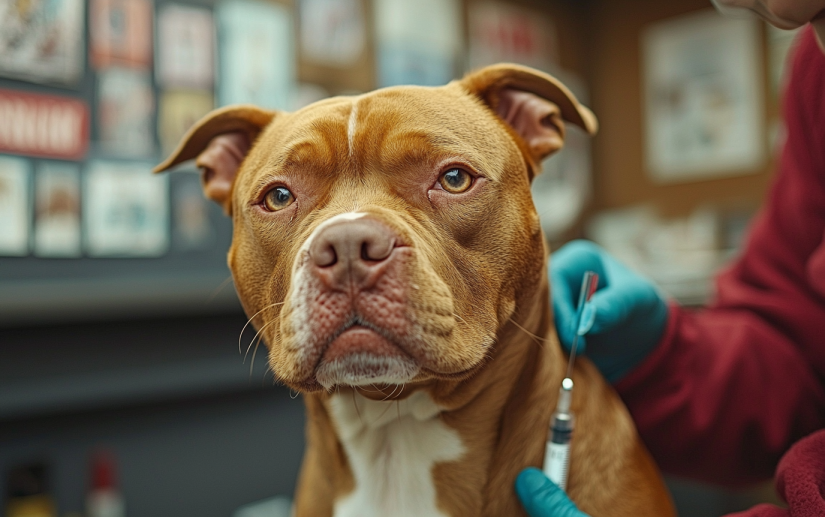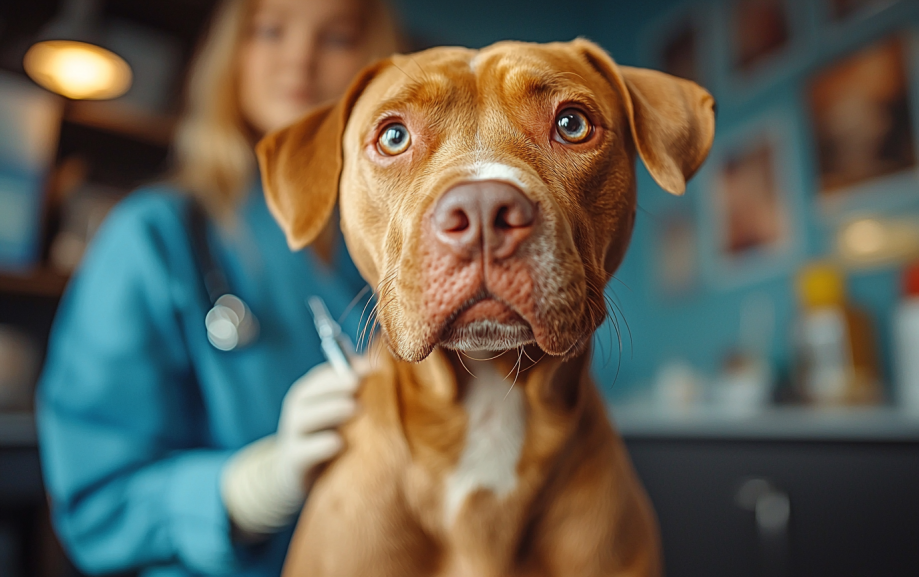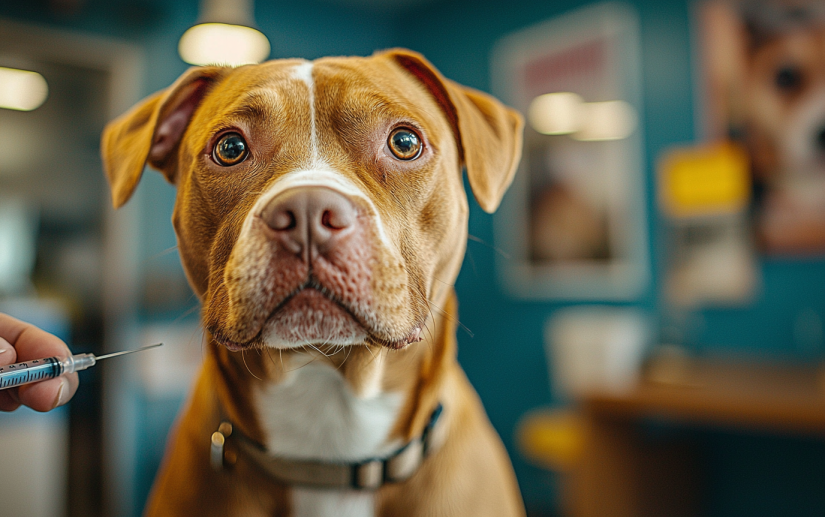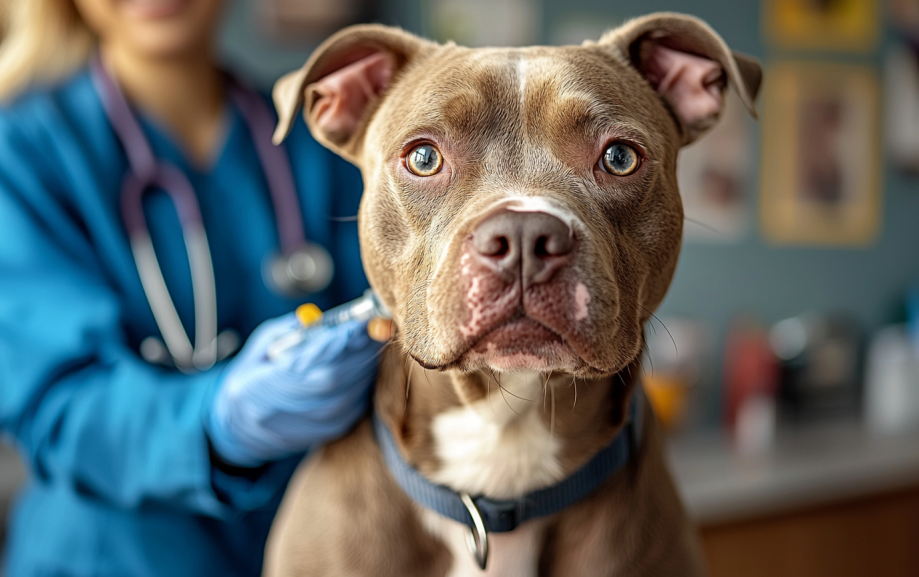Why Dog Vaccinations Are Important
Vaccinations protect dogs from a range of infectious diseases, some of which can be deadly or highly contagious. Not only do they safeguard your pet, but they also help prevent the spread of diseases to other dogs and, in some cases, even humans.
Vaccines work by stimulating the immune system, teaching it to recognize and fight off specific pathogens before they can cause illness. Without proper vaccination, your dog may be susceptible to preventable conditions, which could result in costly treatments or even premature death.
One of the most important reasons for dog vaccinations is the prevention of zoonotic diseases like rabies, which can be passed from dogs to humans. Keeping your dog’s vaccinations up-to-date is not just an issue of protecting your pet—it’s also a public health priority.
Core and Non-Core Vaccines
Core Vaccines Explained
The vaccines that every dog needs regardless of where they live or their lifestyle are core vaccines. These vaccines protect against highly contagious and potentially deadly diseases. The core vaccines include:
- Rabies: This vaccine is legally required in most places. Rabies is a viral disease that affects the central nervous system and is nearly always fatal.
- Canine Distemper: This highly contagious viral disease affects a dog’s respiratory, gastrointestinal, and nervous systems. Without vaccination, it’s often deadly.
- Parvovirus (CPV): A severe gastrointestinal illness that can cause vomiting, diarrhea, and dehydration. Parvovirus can kill puppies within days if left untreated.
- Adenovirus (CAV-2, hepatitis): This vaccine protects against both canine infectious hepatitis and respiratory infections.
Non-Core Vaccines Based on Lifestyle
Non-core vaccines are optional and are administered based on the dog’s exposure risk. These vaccines are recommended based on your dog’s lifestyle, environment, and geographic location. Some common non-core vaccines include:
- Leptospirosis: A bacterial infection that can be transmitted to humans. Dogs that are exposed to water sources like rivers, lakes, or ponds are at a higher risk.
- Lyme Disease: Transmitted through tick bites, Lyme disease can cause joint pain and kidney problems in dogs.
- Bordetella (Kennel Cough): This is often required for dogs that are frequently boarded, groomed, or attend doggy daycare.
Your veterinarian will help you decide which non-core vaccines are necessary for your dog based on your specific circumstances.
READ ALSO: Common Health Issues in Dogs: Signs, Causes, and Remedies
Puppy Vaccination Schedule

The first year of a puppy’s life is crucial for building immunity through vaccines. Here’s a general schedule you can follow:
First-Year Puppy Vaccinations
- 6-8 Weeks:
- Distemper
- Parvovirus (CPV)
- Adenovirus (CAV-2)
- 10-12 Weeks:
- First booster for distemper, parvovirus, and adenovirus
- Optional: Leptospirosis, Bordetella, Lyme disease
- 14-16 Weeks:
- Final round of core vaccines (Distemper, Parvovirus, Adenovirus)
- Rabies vaccine (depending on local laws)
Key Milestones in Puppy Vaccines
- 6 months: Spaying or neutering may be accompanied by a rabies booster depending on local guidelines. Your puppy should have completed all core vaccinations by now.
- 12 months: Your dog will need booster shots for core vaccines, especially rabies.
Puppies are highly vulnerable to diseases because their immune systems are still developing. Follow this schedule closely to ensure your puppy is protected.
Adult Dog Vaccination Schedule
Once your dog reaches adulthood, their vaccination schedule will revolve around booster shots to maintain immunity.
When Adult Dogs Need Booster Shots
- Core Vaccines:
- Rabies boosters are required every 1-3 years, depending on the law in your area and the specific vaccine your vet uses.
- Distemper, parvovirus, and adenovirus boosters are usually administered every 1-3 years.
- Non-Core Vaccines:
- Vaccines like leptospirosis and Bordetella may need to be administered annually, especially if your dog is regularly exposed to other dogs or high-risk environments.
Regular veterinary checkups are essential to ensure that your dog’s vaccination schedule is up-to-date. Your vet will advise on when each booster is needed based on your dog’s health and lifestyle.
Customizing the Schedule for Older Dogs
Senior dogs may not need as many vaccines as younger dogs, especially if they have been consistently vaccinated throughout their lives. However, some vaccines, like rabies, remain a legal requirement regardless of age. Work with your vet to tailor a plan that takes into account your dog’s age, overall health, and lifestyle.
Vaccination Side Effects: What to Expect
While dog vaccines are generally safe, mild side effects are possible. It’s important to know what’s normal and when you should be concerned.
Common Side Effects of Vaccines
- Mild Fever: Your dog may have a slight fever for a day or two after vaccination.
- Lethargy: It’s common for dogs to be tired or less active after receiving vaccines.
- Soreness at the Injection Site: You may notice your dog is sensitive or sore where the injection was given.
These symptoms typically resolve within 24-48 hours. If they persist or worsen, it’s best to consult your vet.
Caring for Your Dog After Vaccination
Make sure your dog has a comfortable, quiet space to rest after their vaccination appointment. Keep an eye on them for any unusual symptoms, like persistent vomiting, swelling at the injection site, or difficulty breathing. In rare cases, dogs can have allergic reactions to vaccines, so if your dog seems to be in distress, contact your vet immediately.
Rabies Vaccination: Legal Requirements and Importance

Rabies is one of the most serious diseases that dogs can contract, and it’s almost always fatal once symptoms appear. In many countries, rabies vaccination is a legal requirement, and failure to vaccinate can result in hefty fines or even the euthanasia of unvaccinated pets.
In the U.S., for instance, most states require dogs to receive a rabies vaccine at 12-16 weeks of age, followed by regular boosters. Be sure to keep your rabies vaccination certificate up-to-date, especially if you plan to travel with your dog or enter them into competitions.
Travel and Boarding Vaccination Requirements
If you plan to travel with your dog, especially internationally, many countries require specific vaccinations, like rabies, to be up-to-date. You may also need to provide proof of vaccination when booking a stay at kennels or dog boarding facilities.
Kennel cough (Bordetella) is another common vaccine required by boarding facilities. Make sure your dog is vaccinated at least two weeks before travel or boarding to ensure they’re fully protected.
Debunking Common Myths About Dog Vaccinations
Vaccinations have been subject to myths and misinformation. Let’s clear up some common ones:
- Myth 1: Vaccines can cause the disease they’re meant to prevent.
Fact: Vaccines use killed or weakened forms of viruses that cannot cause disease. - Myth 2: Dogs don’t need vaccines after a certain age.
Fact: While senior dogs may need fewer vaccines, they still require certain core vaccines like rabies throughout their lives. - Myth 3: Indoor dogs don’t need vaccines.
Fact: Even if your dog rarely goes outside, they can still be exposed to viruses carried by other animals or humans.
Cost of Dog Vaccinations
Average Costs of Vaccines
- Puppy vaccines: The initial series can range from $75-$150 depending on the clinic and location.
- Adult dog vaccines: Annual boosters can cost between $50-$100.
- Rabies vaccines: This typically costs between $15-$25 per shot, depending on local regulations.
Saving Tips for Pet Owners
- Low-Cost Clinics: Many communities offer low-cost vaccination clinics through shelters or nonprofit organizations.
- Pet Insurance: Some pet insurance plans cover the cost of vaccinations, so it may be worth looking into a plan that includes preventive care.
How to Prepare for Your Dog’s Vaccination Appointment

Taking your dog for vaccinations can sometimes be stressful for both you and your pet. Proper preparation can make the process easier.
Before the Appointment
- Know the Schedule: Double-check your dog’s vaccination history and ensure you know which vaccines are due. If it’s a puppy, bring any previous records you’ve received from the breeder or shelter.
- Health Check: Ensure your dog is in good health before the appointment. If your dog has been ill or is showing signs of illness, consult your vet, as vaccines are generally only given to healthy dogs.
- Mental Preparation: If your dog gets anxious at the vet’s office, try to make the trip positive by offering treats and praise. You can also bring their favorite toy or blanket to help keep them calm.
During the Appointment
- Ask Questions: Use this time to ask your vet any questions about the vaccines, side effects, or your dog’s overall health. It’s helpful to fully understand what’s being administered.
- Monitor Reactions: Most dogs will behave normally after their vaccines, but watch for any signs of discomfort or unusual behavior, like excessive scratching at the injection site.
After the Appointment
- Comfort and Rest: It’s common for dogs to feel a bit sluggish after getting vaccinated. Provide a quiet and comfortable space where they can rest.
- Observe for Side Effects: While most side effects are mild, such as soreness or slight fever, you should be on alert for any more serious reactions like swelling or difficulty breathing. Contact your vet immediately if you notice anything abnormal.
Conclusion
Keeping your dog up-to-date on vaccinations is one of the most important things you can do to protect their health and well-being. From core vaccines like rabies and distemper to optional but crucial vaccines based on lifestyle, knowing the proper vaccination schedule will help ensure your dog stays happy, healthy, and safe.
Be sure to consult with your veterinarian to develop a vaccination plan tailored to your dog’s needs, and always stay informed about any local laws or requirements related to rabies or other vaccines. A well-vaccinated dog is a healthy dog—and a happy one too!





